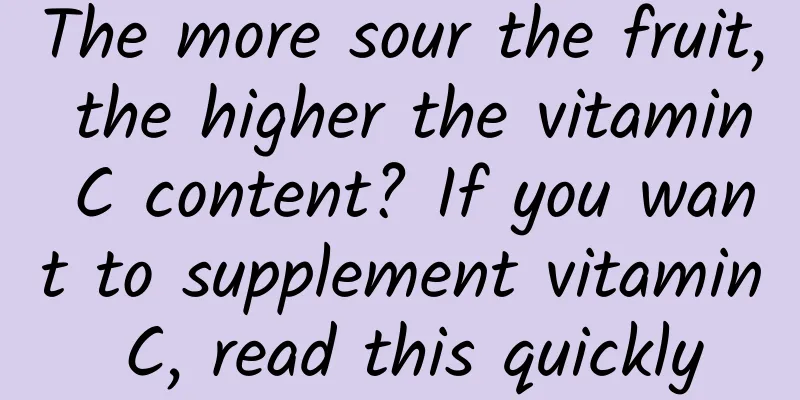The more sour the fruit, the higher the vitamin C content? If you want to supplement vitamin C, read this quickly

|
"The more sour the fruit tastes, the higher its vitamin C content?" Vitamin C tablets taste sour, so fruits with high vitamin C content must have high vitamin C content. Rumor Analysis This statement is not rigorous. Vitamin C tablets are sour, but that doesn't mean they are necessarily vitamin C. The sour taste of fruit mainly comes from organic acids, so some fruits that taste very sour actually do not contain high levels of vitamin C. Copyrighted stock images, no reproduction is authorized The sourer the fruit, the richer the vitamin C? Vitamin C has nothing to do with taste. Let’s first take stock of the fruits with a sour taste in our daily lives: lemon, hawthorn, passion fruit, kiwi... If we judge the vitamin C content based on the sweetness or sourness of the taste, then the vitamin C content in lemon, which ranks first in sourness, must be very high. No wonder many people slice lemons and soak them in water to supplement vitamin C! However, by consulting the latest edition of "Chinese Food Composition Table", we can learn that the vitamin C content of lemon is 22 mg/100 g. This amount of vitamin C is not as high as that of Chinese cabbage, and is only 1/3 of the vitamin C content of Chinese cabbage (64 mg/100 g). Copyrighted stock images, no reproduction is authorized Even when comparing fruits, the vitamin C content of lemons is not superior, and is not as high as the vitamin C content of oranges we usually eat (33mg/100g) . In addition, oranges are more easily accepted by the public, are more convenient to eat, and are easier to supplement vitamin C. Lemons are so sour that they are only used to make lemonade or seasoning. I believe no one would eat them directly! I have seen videos of people trying to eat a whole lemon without any expression, but most of them failed. The vitamin C content of other sour fruits: passion fruit, hawthorn, kiwi fruit are 32mg/100g, 53mg/100g, 62mg/100g respectively . Among them, kiwi fruit is more suitable for supplementing vitamin C. Eating two kiwi fruits a day can almost meet the vitamin C requirement for the day. Although hawthorn seems to have a decent amount of vitamin C, it is high in calories. The calories of hawthorn per 100g are 102kcal, which is 1.7 times the calories of kiwi fruit (61kcal/100g). If you want to get enough vitamin C for a day by eating it, you need to eat 200g. Eating so much hawthorn may make you fat! The source of fruit sourness - organic acids In fact, the sour taste of fruit does not come from vitamin C, but is determined by the organic acids in the fruit. If the organic acid content is high and the sugar content is low, the fruit will taste sour. Copyrighted stock images, no reproduction is authorized Different organic acid components in fruits have different effects on the sourness of fruits. Fruits with high citric acid content have a sour taste; fruits with high tartaric acid content have a sour and slightly astringent taste; fruits with high malic acid content have a sour and slightly bitter taste. Which fruits supplement vitamin C and how much is appropriate to eat? The following 5 kinds of fruits are recommended for supplementing vitamin C: in conclusion It is not reliable to judge the vitamin C content of fruits by their sweetness or sourness. A sour taste does not mean that the vitamin C content is high. If you want to supplement vitamin C, you can choose the above 5 fruits. Looking in the mirror of rumors We tend to trust our senses, but our senses are not as reliable as instruments and cannot truly measure the content of nutrients. In addition to the unreliability of identifying vitamin C by sour taste, it is also unreliable to identify sugar content by sweet taste - there are indeed fruits that taste very sweet but are not high in calories. Knowing more about this will help us enjoy delicious food while staying healthy. References [1] Yang Yuexin. Chinese Food Composition Table 6th Edition Volume 1[M]. Peking University Medical Press, 2018 [2]. Zheng Lijing, Nie Jiyun, Yan Zhen. Research progress on sugar and acid components and their effects on fruit flavor[J]. Journal of Fruit Science, 2015, 32(2):304-312. Planning and production Author: Xue Qingxin, member of Chinese Nutrition Society, registered nutritionist, health manager, public nutritionist Reviewer: Gao Chao, Associate Researcher, Institute of Nutrition and Health, Chinese Center for Disease Control and Prevention Editor: Ding Zong Proofread by Xu Lai, Lin Lin The cover image and the images in this article are from the copyright library Reprinting may lead to copyright disputes |
<<: When AI learns how to deceive humans...
>>: The expert responses to the “Ten Questions on Science” campaign are here!
Recommend
Seriously, Lao Luo, does it really not matter whether you win or lose?
Yesterday, for most couples, it was a grand 520 c...
Where is the arrow of time heading? Physicists are uncovering the mystery of the "arrow of time"
So far, people's understanding of time has al...
How to do a good job of promotion and traffic generation? Here are 3 tips for you!
In the new consumption era, pure traffic diversio...
Deconstructing Hua Xiaozhu’s operational strategy!
1. What is Flower Pig ? Hua Xiaozhu is a taxi-hai...
Eating vegetarian food for fitness in winter will make you fatter. What is the correct way to eat vegetarian food?
In recent years, vegetarianism, which refers to e...
Is the awkward advertising placement really a panacea for brand marketing?
This is the best of times. For film and televisio...
The feat of conquering the moon: the four major challenges and technological breakthroughs facing my country's manned lunar landing
my country has announced its goal of achieving it...
China Automobile Dealers Association: Analysis of China's imported automobile market in September 2022
Customs import volume (I) Supply: After three yea...
ASO optimization, some things you have to know when doing ASO!
1. The world is in dispute, and CPs discuss ranki...
Who is most likely to become the fourth pole of China's Internet?
[[157689]] BAT has already occupied an absolutely...
Compared with Android 5.0, the surprising changes in Android M
We've got our hands on every Android M demo r...
PC shipments continue to decline, domestic mobile phone competition is still unresolved, Lenovo's future lies overseas
Lenovo Group released its financial report for th...
How often do you turn off your router at home? Thanks to the broadband technician's reminder, I realized I might have done something wrong.
Routers are the first choice for thousands of hou...
From the Hooked user incentive model, a comprehensive analysis of why "Honor of Kings" makes you addicted?
Why is " Honor of Kings " so popular? W...









